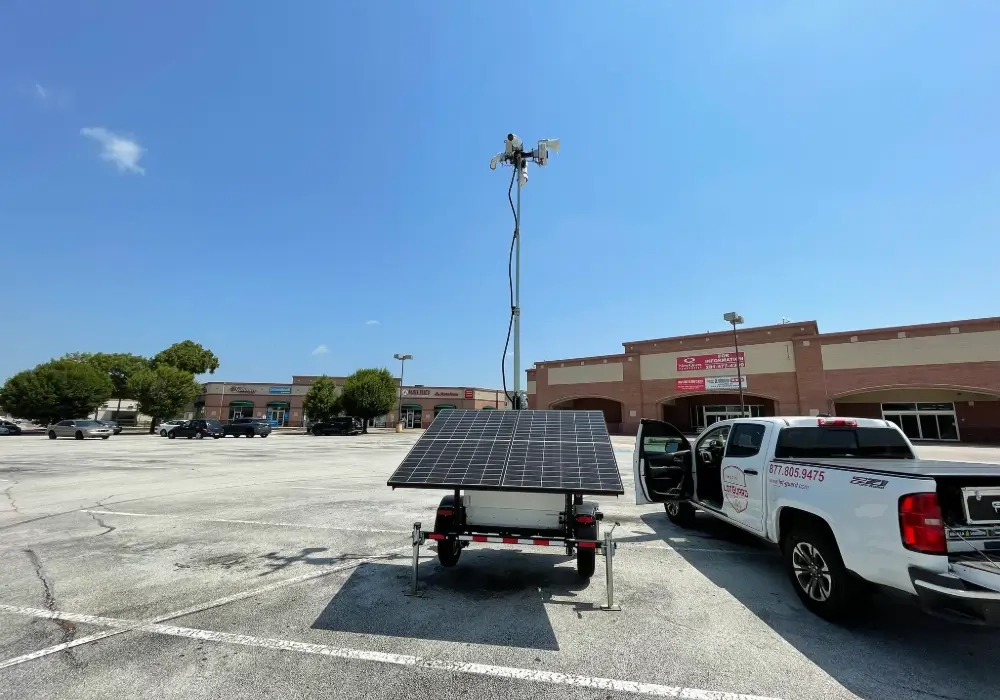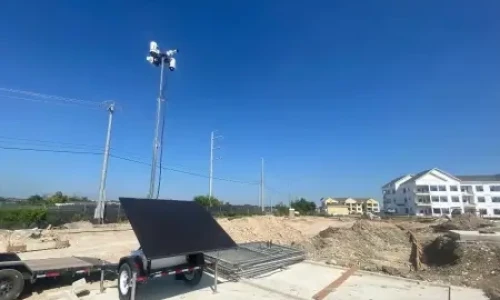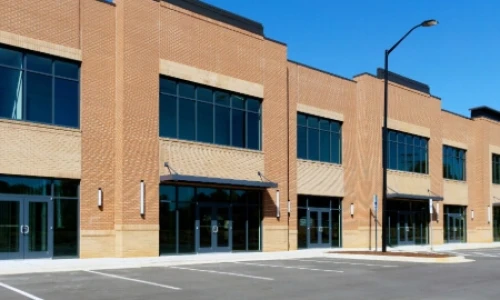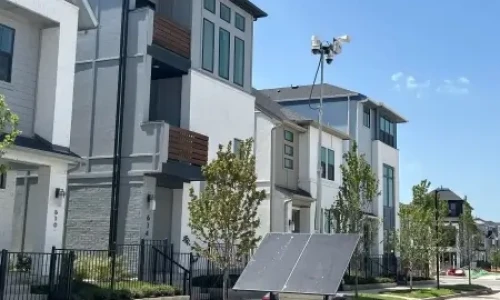In Austin, Texas alone, blocks with vacant properties had twice as many drug and theft crimes as blocks without vacant properties.
Whether it be residential or commercial, vacant properties draw attention and not always the kind of attention you want.
With increased risks of squatting, vandalism, intrusion, and property deterioration, you are responsible for preventing crime and maintaining standards, otherwise you risk facing legal and financial consequences for non-compliance.
What is a Vacant Property?
So, what is classed as a vacant property?
For dwelling properties, these are considered vacant if the property is completely empty, which means no occupants or personal property are left inside of it.
However, for commercial properties, vacant property is measured differently. In these instances, a building is considered vacant unless at least 31% of its square footage is occupied.
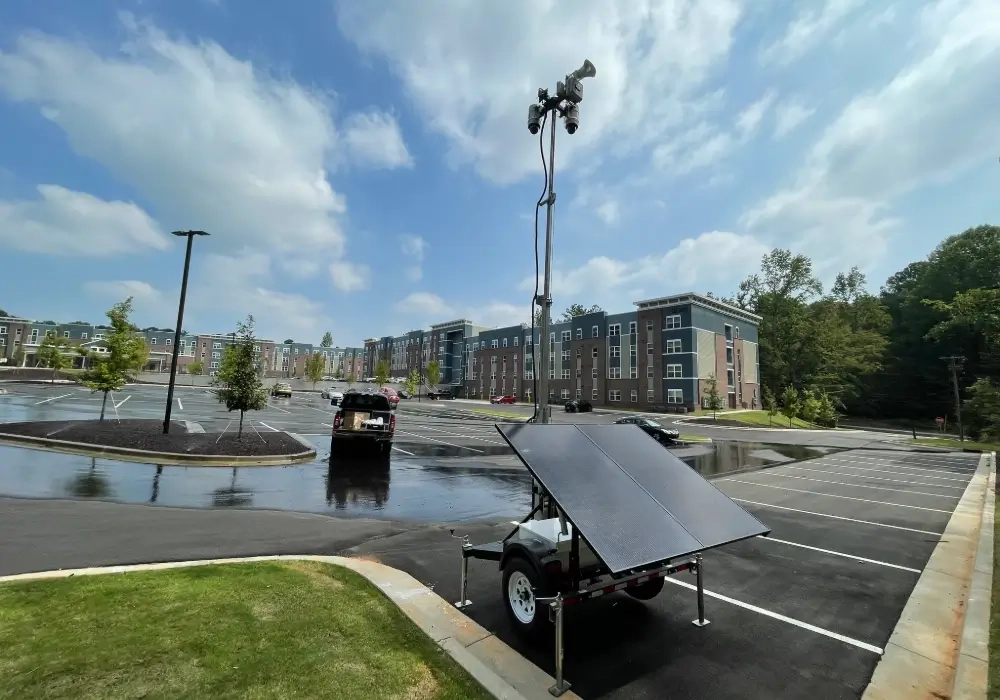
Understanding Vacant Properties Within Texas
According to Self, most recent statistics show that Texas has 1,194,539, which is a small increase from the previous year.
Although for retail space, many areas within Texas had high occupancy numbers and vacant property was minimal amongst this industry, office buildings had higher rates of vacancy.
Austin, Dallas, and Houston, each had a vacancy rate of over 20% with their office space as of the most recent statistics. This has been linked to the pandemic, with the industry suffering heavily following COVID-19.
Like with all States, inflation has impacted the property market with both residential and commercial property.
Rental and leases have increased, along with the cost of utilities, meaning more individuals and businesses are choosing to leave and potentially transition location or close up completely. This forces properties into vacancy with owners and property managers left to take responsibility for the property and its security.
For example, within Texas the multifamily sector has faced an increase in cost per square foot which will have a knock-on effect to all those within the sector.
What Are the Risks to Vacant Properties?
Compared to occupied properties or buildings, vacant properties lack the daily checks that can be completed by the occupants. This leads them to face various risks, whether that be crime-related or due to poor maintenance.
Specifically for vacant properties within Texas, there are several security risks you should be aware of:
Water Damage
Texas often faces harsh weather conditions including frequent rainfall, hurricanes, flooding in particular locations, and at times freezing conditions, all of which place properties at high-risk of water damage.
With seasonal weather fluctuations bringing warmer, drier weather conditions, this can lead to burst pipes due to the severe temperature transition that can take place.
Water damage can significantly impact the structural integrity of the property causing:
- Rotting wood
- Sagging ceilings and walls
- Damaged flooring
- Compromised foundations
- Fire and electrical hazards
- Damp and mould
- Bad odour
Depending on the extent of damage, it can be expensive to repair and create delays if the property is intended to be occupied in the near future.
As vacant properties have no occupants, daily checks on the condition of it will not take place naturally and this is where water damage can develop and worsen.
Vandalism
With no individuals or a reduced number occupying a vacant property, crime like vandalism is easier to complete. This is due to the lack of security that is often present in these cases.
Types of vandalism can vary from graffiti and property damage to broken windows and theft of materials.
The effects of such crime can be costly and place your property or building at increased risk of further damage. It could encourage other individuals to inflict more damage or lead it to be exposed to weather conditions like rain and wind, all of which could harm your property also.
Drug Use
Vacant properties are frequently linked to increase drug use, and this can cause problems for both the property and surrounding community.
Drug users may utilize vacant properties as places to gather, socialize, and engage in illegal activity as there is a lowered likelihood of any occupants removing them from the property or building.
Those found to be neglecting the property and not addressing such matters can face legal ramifications and cause strained relationships within the community and businesses.
As this property type draws unwanted attraction like drug use, for residential properties at times it will impact the resale value on the surrounding homes and with the property itself.
Whereas for commercial properties, it can create public safety issues and prevent customers from attending your building or other businesses closeby.
Theft
With both residential and commercial properties, being void of any personal property, goods, or office equipment does not prevent theft from taking place at your vacant property.
Especially with metal theft on the rise, thieves are targeting HVAC Units and other items where metal types such as copper and steel are present. These are quick wins, but produced high rewards for them.
If regular checks are not completed on the property, theft could go unnoticed for a long period of time and impact the property’s condition if required to ensure the correct functioning of it.
The removal of such goods can create electrical risks in which for safety purposes, you would need to address and resolve at the earliest stage possible.
Depending on the type of theft also, replacing items like this can be expensive and take time to both arrive and fit.
Additionally, vacant properties which face theft are likely to be prone to future thefts as individuals will be aware that security lacks there and any criminal activity is easier to conceal for them.
Property Deterioration
Maintaining the condition of any property is central to the property value and future profit that can be earnt from the sale or rental of it.
A property in poor condition may not gain interest from potential buyers and at worst, prevent you from placing it up for sale unless the issues can be resolved.
The risk with any vacant property is that without daily checks, property conditions could change and worsen without anyone being aware of this. Therefore, making it more vulnerable to further damage from other property issues which could develop from the original issue.
Homelessness Encampments and Squatting
From the most recent data, there are a total number of 57,685 people experiencing homelessness in Texas, and this poses risks to any vacant properties within the State.
Although existing support and accommodation is available to support those who are homeless, the amount of resources is still lower than the number who require it. This can lead individuals to seek shelter elsewhere.
For commercial property and any parking lots connected to this, homeless encampments can form, and although illegal can be difficult to remove. It also increases the risk of property damage, drug use, and theft.
Additionally, more commonly seen in residential vacant property, an individual or group of individuals may utilize the property for squatting. Even without any personal property it provides those homeless with a place to accommodate themselves as there is no occupant to challenge them.
Legal Complications
Although a property is vacant, whether it be a home, office building, apartment block, or retail store, as the owner or property manager, you are still responsible for maintaining its condition and safety levels.
However, if an individual enters the property grounds even without any authorization and an injury or at worst death occurs due to the neglect of the property, you could be held liable to this.
Vacant properties will likely have a higher number of hazards compared to occupied properties, increasing the chances that injury could occur, especially for an individual unaware of the property layout.
In these instances, you may face legal and/or financial consequences related to the incident, depending on the level of severity.
Fire Hazards
Although some appliances will not be present in a property or building that can create fire hazards, there are still numerous fire hazards linked to vacant properties.
In fact, you’ll be surprised to know how many there are:
- Combustible materials like accumulated debris and trash
- Reduced fire detection if fire or smoke alarms have been removed
- External environmental factors
- Arson
- Electrical faults like damaged wiring and broken power outlet
- Pests chewing electrical cables, causing sparks, and potential fires
Due to having little to no occupants, fires can spread quickly and create more damage than in those where occupants can notify the relevant authorities in the moment.
Things to Consider with Vacant Property Management
Keeping vacant properties safe helps to keep you and potential clients safe also from any of the consequences caused by poor maintenance and property management.
For property owners and managers, there’s 5 key elements to consider when managing a vacant property to ensure you protect it from the associated risks:

Understand Your Obligations as an Owner or Property Manager
The first step to protecting any property, but specifically vacant properties is to understand what your obligations are as a property owner and manager.
This helps to avoid any legal or financial consequences from not complying with any policies or laws in place surrounding vacant properties.
In most instances, the first step will be to register the property as vacant. This process varies between different Cities within Texas, however, generally it follows the below process:
- The owner will receive a written notice that the property is vacant.
- Following this, the owner or property manager will need to register the property within the time period provided.
- At the end of the registration process, a fee will need to be provided and any annual fees related to this.
- Documentation including the floorplan, proof of insurance, and a plan for maintenance and rehabilitation.
- Finally, an inspection may be requested to ensure any city safety standards and compliance are being adhered to.
This process allows cities to remain aware of the properties sat vacant and the fees help to cover any relevant inspection costs linked to them.
You have an obligation yourself, especially as property managers, to inspect the property or building on a regular basis to ensure it is still complying to the city’s specified standards. Otherwise you may face fines or more severe penalties.
Regarding access, you should establish this early on if property managers are involved as this will likely include a written agreement that states who would be liable for any property damage.
Overall, it’s important that for every vacant property you are responsible that you understand the obligations and recommendations for every type of property. This protects both you and the client if you are acting on their behalf.
Check Your Property Insurance
It is recommended that all unoccupied property has vacant home insurance in order to protect it in case of any damage, whether that be from weather, criminal damage, or a property-related issue.
Although it is not legally required, there are many benefits to it. Vacant home insurance typically protects against damage from fires, lightning, windstorms, hail, and other weather conditions, as well as crime such as vandalism and theft.
It can also cover medical and legal expenses if someone is injured on the property.
As vacant property faces unique challenges, having the correct insurance is central to the protection of the property and for you legally and financially.
Costs of vacant home insurance will vary in Texas depending on a number of factors including property location, value, and duration in which the property will be unoccupied for.
If the property was in use before and you already had some form of property insurance, you will need to check the length that it covers if the property is left vacant as this tends to be no more than 30 to 60 days.
After this, your property will not be protected and you should invest in vacant property insurance.
Consider the Impact on the Property Value
A vacant property generally tends to depreciate in value on its own and impact the value of nearby properties also, so if you intend to sell the property, there are some key points you should keep in mind.
Therefore where possible, try to gauge the length of time the property will be vacant for and plan in methods to maintain it during this time to protect against the risk of lowered property value.
Often vacant properties will be less appealing to potential buyers as it will be assumed that repairs, renovation, cleaning will be required. To combat this, you should try to keep on top of any maintenance and ensure any repairs are completed prior to advertising the property.
Vacant residential properties including apartment buildings, if left vacant for a long period of time can create an image that the location is indesirable.
In these instances, it may be beneficial to set a goal as to when you wish to have the property on the market or sold, so that the value does not decline too heavily.
As vacant properties, both residential and commercial face increased risks of criminal activity like vandalism, meaning that maintenance issues are more likely to occur. If any potential buyers see this damage, it can deter them from buying or leasing the property.
Unmaintained vacant properties can attract nuisance issues like squatting and drug use which can cause concerns to any potential buyers. For commercial properties in particular, buyers want to be confident in the area as it helps with the portrayal of their business.
Regular inspections and increased security can help to prevent this type of illegal activity and protect your property value.
Methods to Maintain the Property
Vacant property maintenance is vital in upkeeping its condition and preventing it against any property deterioration such as mold, damp, and electrical faults.
It also helps to prevent crime as it shows those in the surrounding area that the property is being monitored and cared for, presenting itself as a more difficult target for thieves and criminals.
There are multiple methods you can utilize to help with maintaining a vacant property, both for residential and commercial property:
- Make regular inspection visits to keep an eye on the property’s condition.
- Clean the property as often as possible to prevent the accumulation of dust, dirt, and other materials that could all create fire hazards to the property.
- Ensure you have implemented a pest prevention method to stop any infestations from occurring.
- Carry out exterior maintenance on a periodic basis to check for any potential water damage and that the roof, gutters, windows, and door are all working correctly to prevent this.
- Disconnect any non-essential services and implement a minimal heating plan to prevent mold and damp.
- Implement a security system to prevent crime when no one is present at the property.
Overall, you need to consider your property and its specific needs, implementing a maintenance plan that suits your role and that also helps to protect the property.
Small changes to help maintain the property can help more than you think, so think about the steps you can take to support yourself or your client.
Implementing or Enhancing Security Measures
One of the main recommendations with any vacant property is to implement or enhance your security measures to ensure optimized protection against the multiple risks presented to them.
With reduced to no occupancy, vacant properties are a clear target for criminals as there is an assumed sense of protection. Often seen to have a lack of security, intruders can hide undercover and carry out illegal activity without risk of being caught.
This is where boosting your security solutions can support you in preventing crime and any damage to your property that could take place.
Although internal surveillance systems are beneficial to protect the interior of the property and capture any deterioration that may occur or maintenance issues, any crime will often begin on the outside of the property and this is where you should focus your security.
Especially for apartment blocks and commercial property where you can utilize your parking lot to provide enhanced external security.
At LotGuard, we specialize in parking lot security solutions that support industries such as vacant property and property management in general.
For most, the dangers begin externally and instead of waiting till intruders enter the property, whether it be a vacant office building or apartment block, the best response is to prevent unauthorized access in the first place.
This method also helps to protect against property damage and vandalism, all of which internal security or perimeter fencing cannot provide.
The LotGuard PRO Surveillance Trailer provides a best-in-class, fully-managed security service that requires no input from you. Fitted with complete power autonomy and cellular connectivity, it can provide high-quality support that is mobile to your needs.
Backed by infrared PTZ cameras and remote monitoring services, you will receive 24/7 live monitoring day to night that can deter, detect, and deal with active crime.
Implementing a system such as this will help not only protect your property, whether it be residential or commercial, but it also helps to reduce insurance premiums.
Therefore, consider your property’s weak spots and the security measures that can be installed to manage this. Taking a blended approach with surveillance systems by implementing fencing or guards also, could boost protection even further.
LotGuard’s Solution to Vacant Property Security
As vacant property numbers steadily rise in Texas, how are you supporting your property from the security challenges presented to them?
Get in contact with a Surveillance Trailer expert today to find out how you can boost your vacant property security for yourself or your client
Contents
[hide]Related news
Contact Us
Request a Quote for LotGuard
Ready to learn more about how LotGuard can protect your Parking Lots and Properties? Get in touch today for a free quote.

